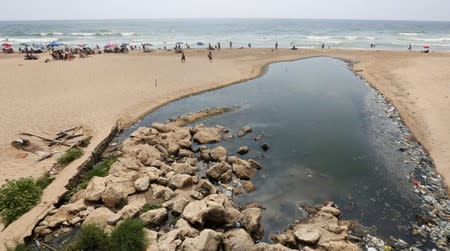By Imad Creidi BEIRUT (Reuters) – On a beach in northern Lebanon, men and women swim in the Mediterranean’s warm blue waters close to a sewage outlet, while children play in sand that is strewn with litter. A sign warning against swimming because of pollution seems to have had little effect on this beach near the city of Tripoli, one of a declining number of public beaches in Lebanon. Poorer Lebanese have few good choices to enjoy the beach in the sweltering Middle Eastern summer. Drive down the coastal highway and the signs point to one expensive resort after another, with little space left for public access. “If people had money they wouldn’t come here… If someone has four or five children, where could he take them? If his salary is $500 or $600 a month, where could he take them?” said 63-year-old Adnan Daouk at the only public beach in the capital Beirut.
Pollution spills into the sea along stretches of Lebanon’s often dramatic, hilly coastline. In places, raw sewage sometimes washes into the water, according to a recent report on public beaches by the state-run National Centre for Marine Sciences. Lebanon also has a rubbish disposal problem. Landfill sites, some by the seashore, are overflowing and in recent years, winter storms have covered nearby beaches with plastic.
Even some private beaches are affected. A dirty coast may make it harder for badly indebted Lebanon to draw back tourists and revive its one-time image as an elite Mediterranean playground offering skiing, Roman ruins, beaches, wine and fresh seafood within its tiny borders. Fishermen dangle their lines each day off Beirut’s seaside Corniche, either selling their catch or taking it home to eat. But the water there is washed with trash and little slicks of oil give a rainbow sheen to the waves. “The day will come when we certainly won’t be eating fish anymore. We will be disgusted to eat fish,” said one of them, Abou Mahmoud, 69.
In its report on public beaches, the marine sciences centre rated four near Beirut and another near Tripoli on a spectrum between dangerous and highly polluted because of the amount of fecal streptococci in water samples. At another beach near the pretty ancient fishing town of Batroun, there was highly dangerous chemical pollution, the centre said. Numerous other public beaches, while not as bad, were not in the safe range defined by the World Health Organisation. However, some in southern and central Lebanon were ranked as good. Public statistics on ownership are hard to come by in Lebanon, but one 1997 report showed that four fifths of the shore along the central coastline was privately owned. The marine sciences centre rates the long sandy public beaches between Naqoura and Tyre in the far south of Lebanon as the best in the country. They are a popular destination for day-trippers from Beirut and a nesting site for sea turtles.
But many people from Beirut or areas further north are loathe to spend the extra money on petrol or risk getting stuck in the long traffic jams each weekend. Youssef Kamoun, a 52-year-old nurse in Beirut who earns less than $1,000 a month, does not want to spend money on petrol and so he usually takes his children to the beach in Beirut even though he knows the Beirut coast is dirty and he fears for his children’s health. “I wish it was cleaner. I wish the state would work more on it,” he said, sitting on Beirut’s Ramlet al-Bayda beach with his sons Andrew, 7, and Adam, 5. “We don’t go very deep in the water. We choose the spots that are cleaner and I stay ahead of (the children)… I don’t leave them alone, not even for a second,” he said.




